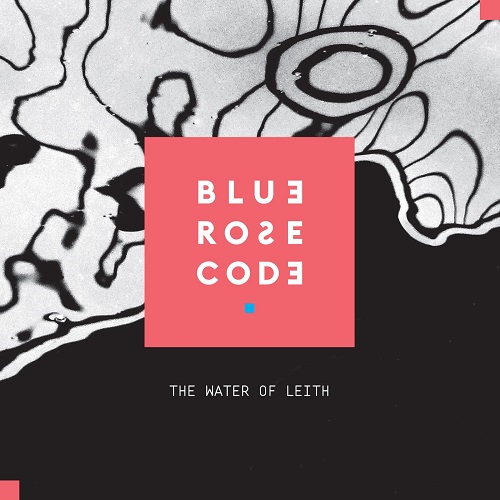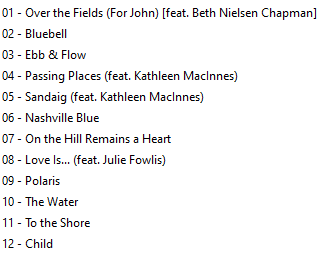|
(2017) Blue Rose Code - The Water of Leith
Review:
It’s been fascinating, and rewarding, to follow Ross Wilson’s progress, as Blue Rose Code, since the release of his 2013 debut, North Ten. That initial appearance on the scene was thoroughly, and rightfully, well-received; showing all the signs of an already flourishing creativity. With his fourth studio album The Water of Leith released this month, Blue Rose Code continues to draw on his increasingly inventive ability, as he quietly weaves flavours from a range of musical influences and personal experience, to produce his most thoroughly absorbing album to date. Wilson’s gift for songwriting and willingness to explore multiple genres resulted in the creation of two more progressively impressive albums. The Ballad of Peckham Rye saw him move from the accessible and instantly enjoyable songs of his debut, to draw from a deeper well. Every bit as ambitious as it was complex, the album saw Wilson bring his own internal struggles to the surface, writing from the past but looking to the future. That future saw him tentatively reach out from his familiar south of England surroundings, beyond his troubled Edinburgh upbringing, to the far north and a productive song-writing stopover in Shetland for his exceptionally inventive And Lo! The Bird Is On the Wing. With The Water of Leith, Blue Rose Code can honestly, and by the sound of things, happily, declare himself to be home again, as well as finding a new home with his first release on Navigator Records. Recorded and produced by Angus Lyon at his Gran’s House Studio, the album sees Wilson gather some of the most talented jazz and folk musicians from around Scotland, and beyond. Over the Fields opens the album with a warm tribute to Wilson’s friend John Wetton (King Crimson, Asia), who passed away in January this year. The opening combination of Wilson’s voice and John Lowrie‘s piano is instantly calming; with Beth Nielsen Chapman providing a guest vocal appearance, as the repeated “Home, home again” refrain, as the softest of strings foster a bitter-sweet sense of well-being. An early indication that listening to The Water of Leith is going to be a warming experience. The work of award-winning jazz saxophonist Konrad Wiszniewski has become an essential aspect of Wilson’s core sound for this album; initially in the steady but gentle pace of Bluebell, and more energetically in the Latin beats of Ebb & Flow, a song that effortlessly justifies the comparisons made between Blue Rose Code and Van Morrison. These three opening songs together serve as a tantalising introduction, they successfully ease the listener into the rich variety of Wilson’s songwriting, and the hushed warmth of his vocal. It’s a winning approach that finds another outlet later in the album, with the rich Caledonian Soul of Polaris. Among the layers of brass and strings, Wilson realises, at last, his long-held desire to include a piece of Edwin Morgan‘s poetry in his music, with the vivid and intensely beautiful Strawberries. Ross Wilson, you see, is not a man to dwell in the safety of accessibility, a notion more starkly evidenced in On The Hill Remains A Heart. The soft vocal and guitar opening are augmented by Seonaid Aitken‘s elegant string arrangement while piano and percussion discover a beat to lay over the dreamy vocal. As the story of a love lost at war unfolds, there’s a note of urgency from Ross Ainslie‘s smallpipes and the sense of eternity in the lonely epitaph “and she never loved again”. Perhaps inspired by a well known Cumbrian landmark, Ross clearly has an eye, and an ear, for a story. In Passing Places the story is nothing more than a Gaelic voice on the wind (provided by Kathleen MacInnes), as Iain Sloane‘s pedal steel guitar dances in the sun with fiddle and Angus Lyon’s accordion; leading us straight into Sandaig, a celebration of Scotland’s West Coast, where the wind still carries Kathleen’s vocal – a Gaelic voice from the past, in a song that looks to the future with hope. “Like a sun rising just for us” – a song to give your heart wings. The dark comfort of a jazz club is the place for songs of regret, and Nashville Blues is a perfect song for that venue “In spite of all my pretty words, I don’t know how to be in love”. Taking the mood beyond song, though, The Water is an immersive, extensive, piano, bass and trumpet exploration stretching to almost ten minutes. The Water doesn’t meander, it sets a direct course that takes it through dark, somnolent depths and lively shallows as a hint of discordant string leads to the electric piano and vocal of the almost equally epic To The Shore. This is a different journey, with an ethereal ending hinting at rebirth. The two tracks combined constitute a glorious 17 minutes of music you just can’t help surrendering to. Wilson also makes it easy to surrender to a toe-tapper, though. Anyone who was lucky enough to catch Ross and Julie Fowlis together on BBC Alba’s most recent Hogmanay show will remember their unexpected and joyful Islands In The Stream. The joy continues as the pair duet again for Love Is… an upbeat celebration of love with Seonaid Aitken’s jubilant fiddle to the fore. Inevitably, some harsh realities will come through in Wilson’s songs, and those are faced squarely as the album closes with Child. Although sombre to open, there’s a strength from cello and layers of sax; and a brief, hope-filled, change in beat. A life-affirming view through the retroscope.

Tracklist:

Media Report:
Genre: folk-rock, indie-folk
Format: FLAC
Format/Info: Free Lossless Audio Codec, 16-bit PCM
Bit rate mode: Variable
Channel(s): 2 channels
Sampling rate: 44.1 KHz
Bit depth: 16 bits |

